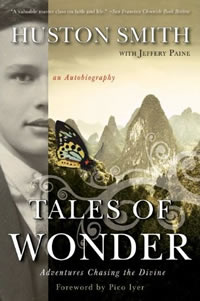Book Notes
 Huston Smith, with Jeffrey Paine, Tales of Wonder, Adventures Chasing the Divine: An Autobiography (New York: HarperOne, 2009), 209pp.
Huston Smith, with Jeffrey Paine, Tales of Wonder, Adventures Chasing the Divine: An Autobiography (New York: HarperOne, 2009), 209pp.
Born to Methodist missionary parents in rural China in 1920, Huston Smith enjoyed a distinguished career as a scholar of world religions at Washington University, MIT, Syracuse, and Berkeley. His book The World's Religions, first published in 1958, has sold 2.5 million copies as an introductory university textbook on the subject. For more than sixty years Smith has been not only an able scholar of comparative religions, but a beloved teacher, a self-described "voice in the wilderness" decrying the corrosive forces of "secular modernity" and scientism which would marginalize religion, and, perhaps above all, an avid practitioner of what he has preached.
As I write, Smith is ninety-one years old. He describes this book as "the one strangest and closest to me." He organizes his autobiography along the two axes that every person experiences, the horizontal one of dates, jobs, people and places, and then the vertical one of our relationship to the sacred. Smith speaks with love, reverence, and unabashed nostalgia about his upbringing in rural China until he came to the States at age seventeen. He's well aware of the charges that he refashioned his own liberal form of faith in defiance of his conservative upbringing. "Well, that's what it may look like from the outside — but not from the inside. My parents' Christianity was, to my boyhood eyes, neither 'missionary' nor 'triumphal' nor 'fundamentalist.' It was, simply, goodness, and as a boy I watched the drama of what goodness can do in the world."
As for the "horizontal" axis of his life, Smith relates twelve "frontiers" or turning points in his life. He's been married to his beloved Kendra for almost seventy years now. They lost an adult child to cancer and a grand daughter to a mysterious murder. He recalls encounters with Huxley, the Dali Lama, and his decades of globetrotting. In the second half of the book he describes his personal Christian faith, and how he "never saw a religion I didn't like." He was a devoted follower of Hinduism, Buddhism, and Islam for ten years each. In a subsequent chapter he outlines his experiences of native religions (North American and aboriginal), entheogens or "God-enabling drugs" (including taking LSD with Timothy Leary), and then ultimate reality. It's no wonder that "some friends accused me of whoring after the Infinite. Well, what better whoredom is there?" For his last word Smith turns to the words of the Christian saint and martyr, John Chrysostom: "Praise, praise for everything. Thanks, thanks for it all."


